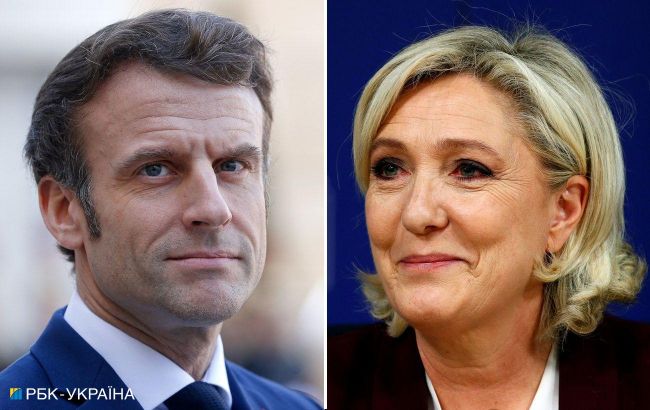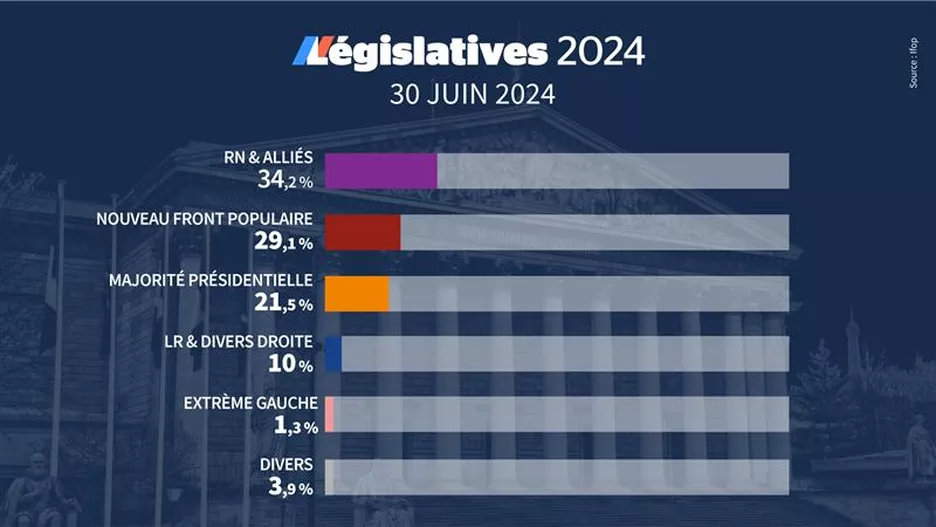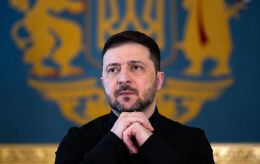Who wins in first round of parliamentary elections in France
 Who wins in first round of parliamentary elections in France (collage by RBC-Ukraine)
Who wins in first round of parliamentary elections in France (collage by RBC-Ukraine)
In France, voting in the first round of parliamentary elections ended on June 30. According to exit polls, the far-right National Rally party won the first round.
France has another round of elections ahead. And since it has a majority system, the situation may change in the second round.
Thus, according to the Ifop exit poll, the National Rally party, whose formal leader is the pro-Russian Marine Le Pen, is supported by 34.2% of voters. The far-left Popular Front is in second place with 29.1% of the vote. But President Emmanuel Macron's political party is in third place with 21.5% of the vote.

Who wins the first round of the French parliamentary elections: exit polls
However, the exit poll conducted by Elabe for BFMTV, RMC, and La Tribune gives the National Rally a little less - 33% of the vote. The Popular Front could get 28.5% of the vote, and Macron's coalition could get 22%.
The turnout in the first round of the French parliamentary elections was the highest in the 21st century and is tentatively estimated at 69.7%.
All candidates who garnered more than 12.5% in the first round will go through to the second round. Given the high turnout, there will be three or four such candidates.
If the National Rally maintains this level of support in the second round of voting, it will be able to win a majority in the French parliament.
The leader of the French left-wing radicals, Jean-Luc Melenchon, has already stated that candidates from his New Popular Front will withdraw from the second round if this will prevent candidates from the far-right National Rally from entering parliament.
"Under any circumstances, our approach is simple: no more seats in parliament for the National Rally," Melenchon said, according to Le Figaro.
In practice, this will mean that if a candidate from the left-wing radicals takes third or fourth place in a constituency, he or she will withdraw, most often in favor of a candidate from Macron's pro-presidential coalition.
However, party candidates are not obliged to obey the party's decision to withdraw their candidacy. In practice, they can run in the second round or, for example, withdraw from the election but support a different candidate than the one their party has indicated they should support.
Parliamentary elections in France
After the European Parliament elections in early June, French President Emmanuel Macron dissolved the French National Assembly (the lower house of parliament) and announced early parliamentary elections.
The reason for this decision was the crushing failure of the presidential party in the European elections. The victory in France was won by the far-right National Rally party, whose formal leader is the pro-Russian Marine Le Pen.
Polls conducted before the parliamentary elections also showed that Le Pen's party would win the first round with about 35% of the vote, while Macron's party was predicted to come in third with 20-22% of the vote.
Read more about the parliamentary elections in France and what Ukrainians should expect from them in RBC-Ukraine's article.

